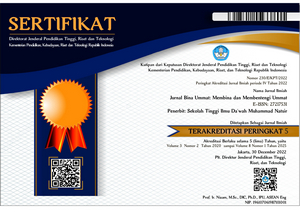FIQIH MINORITAS MUSLIM DALAM BERINTERAKSI KEPADA NEGARANYA
DOI:
https://doi.org/10.38214/jurnaldawahstidnatsir.v4i01.97Keywords:
Fiqih, Interaksi, da’wah, minoritasAbstract
When the Muslim community lives in a country as a minority, they usually stay active with limited space and movement. This is because they come with different religions and cultures. As a minority, Islam regulates how they should interact with the country where they live. Through qualitative methodology and descriptive analysis writing, the author will explain the forms of interaction that must be carried out. The result is six things; Minority Muslims are obliged to preach Islam to the Community and the State, Maintain the implementation of the main religious syari'at for individuals in the life of the state, Maintain the rules of the shari'ah that have been agreed upon regarding its halalness and prohibitions, even though the State legalizes it, Obligation to be involved in the process building the State and resolving the problems of the State, the obligation to maintain relations between fellow citizens of the State and not to carry out rebellion against the State unless they have the ability and after seeing the magnitude of the Maslahat caused
Published
Versions
- 2021-07-30 (3)
- 2021-07-25 (2)
- 2021-06-12 (1)
How to Cite
Issue
Section
This work is licensed under a Lisensi Creative Commons Atribusi 4.0 Internasional.
Authors who publish with this journal agree to the following terms:
- Authors retain copyright and grant the journal right of first publication with the work simultaneously licensed under a Creative Commons Attribution License that allows others to share the work with an acknowledgment of the work's authorship and initial publication in this journal.
- Authors are able to enter into separate, additional contractual arrangements for the non-exclusive distribution of the journal's published version of the work (e.g., post it to an institutional repository or publish it in a book), with an acknowledgment of its initial publication in this journal.
- Authors are permitted and encouraged to post their work online (e.g., in institutional repositories or on their website) prior to and during the submission process, as it can lead to productive exchanges, as well as earlier and greater citation of published work (See The Effect of Open Access).




